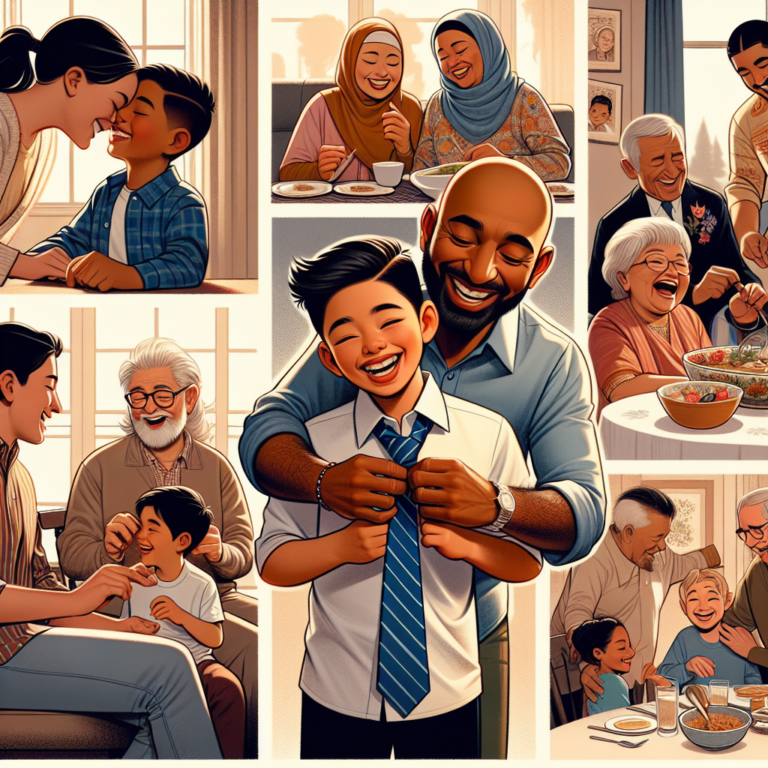In today’s fast-paced world, where technology often outpaces human interaction, the significance of family and respect within familial ties remains as crucial as ever. Families serve as the foundational pillar of our lives, influencing our values, beliefs, and behaviors. This article delves into the profound importance of nurturing respect within the family unit, exploring how parents can play a pivotal role in cultivating an environment of mutual respect and understanding. From building strong bonds that foster harmony to understanding the impact of respectful relationships on our lives, we will examine how these core values shape not only individual families but also the broader community. Join us as we explore the essential elements of family dynamics and the enduring power of respect in creating a harmonious household.
- 1. “Building Strong Bonds: The Role of Family in Fostering Respect and Harmony”
- 2. “The Parent’s Guide to Cultivating Respectful Family Relationships”
- 3. “Family Values: How Respect Among Parents and Children Shapes Our Lives”
1. “Building Strong Bonds: The Role of Family in Fostering Respect and Harmony”
In the intricate tapestry of life, the family stands as a foundational pillar, shaping individuals and influencing their interactions with the wider world. At the heart of this institution lies the critical role of building strong bonds, a process that is essential for fostering respect and harmony. The family is often the first environment where individuals learn the principles of mutual respect and understanding. It is within this intimate setting that parents play a pivotal role in modeling and instilling these values.
Parents are the primary educators in the realm of respect, teaching children not only through direct instruction but also through their own actions and interactions. By demonstrating respect within the family unit, parents set a precedent for how their children will engage with others. This modeling is crucial; when children observe respectful communication and see conflicts resolved with empathy and understanding, they are more likely to emulate these behaviors in their own lives.
Moreover, the family serves as a safe space for individuals to express themselves and learn the nuances of harmonious coexistence. It provides a supportive environment where each member can voice their opinions, share their experiences, and feel valued. This open exchange of ideas and emotions is vital in cultivating an atmosphere of trust and respect. When family members feel heard and respected, it strengthens their bond, leading to a more cohesive and harmonious family unit.
In conclusion, the family is a microcosm of society, and the respect fostered within its walls often extends beyond, influencing broader social interactions. Parents, as the guiding figures, hold the key to nurturing these values, ensuring that the next generation grows up with a deep-seated understanding of the importance of respect and harmony. By prioritizing these principles, families can build enduring bonds that withstand the test of time, enriching both individual lives and the community at large.
2. “The Parent’s Guide to Cultivating Respectful Family Relationships”
Creating a harmonious and respectful family environment is a journey that requires intentional effort from parents. The foundation of any strong family is built on mutual respect, open communication, and understanding, which not only fosters a positive atmosphere at home but also sets the stage for healthy relationships outside the family unit.
One of the primary roles of parents is to model the behavior they wish to see in their children. Demonstrating respect in everyday interactions—whether it’s saying “please” and “thank you,” listening attentively when family members speak, or showing empathy towards each other’s feelings—lays the groundwork for children to mirror these behaviors. Children learn a great deal by observation, and by seeing their parents treat others with kindness and respect, they are more likely to emulate these actions.
Open communication is another cornerstone of respectful family relationships. Parents should encourage honest discussions by creating a safe space where every family member feels heard and valued. This means actively listening to children’s concerns, validating their feelings, and responding with thoughtful feedback. Encouraging children to express their thoughts and opinions not only boosts their confidence but also reinforces the notion that their voice matters within the family.
Setting clear and consistent boundaries is also crucial in cultivating respect. Parents should establish family rules and expectations that promote respect, such as taking turns speaking, respecting privacy, and resolving conflicts peacefully. When these boundaries are consistently enforced, children learn to understand the importance of respecting others’ limits and the consequences of overstepping them.
Finally, incorporating family activities that emphasize teamwork and mutual respect can strengthen family bonds. Engaging in regular family meetings, game nights, or collaborative projects can teach children the value of cooperation and shared responsibility in achieving common goals. These activities not only bring family members closer but also reinforce the importance of working together respectfully.
 Also Read:
Parents as Pivotal Architects of Family Dynamics
Also Read:
Parents as Pivotal Architects of Family Dynamics
In conclusion, cultivating respectful family relationships requires a deliberate effort from parents. By modeling respectful behavior, fostering open communication, setting clear boundaries, and engaging in collaborative activities, parents can create a nurturing family environment where respect and understanding thrive. This foundation not only benefits the immediate family but also equips children with the social skills necessary to navigate the broader world with respect and empathy.
3. “Family Values: How Respect Among Parents and Children Shapes Our Lives”
The cornerstone of any thriving family is the mutual respect shared between parents and their children. This foundational value, often instilled from a young age, plays a crucial role in shaping the dynamics of a household and, by extension, the lives of each family member. When respect is present, it fosters an environment where open communication, trust, and understanding can flourish, allowing both parents and children to express themselves freely and without fear of judgment.
Respect among family members starts with parents who model the behavior they wish to see in their children. When parents demonstrate respect through their actions and words, children learn to emulate these behaviors, understanding the importance of considering others’ perspectives and valuing their opinions. This ongoing exchange of respect helps to build a strong family bond, where every member feels valued and heard.
Moreover, a family environment grounded in respect encourages children to develop into respectful and empathetic individuals outside the home. They carry these lessons into their interactions at school, with friends, and eventually, into their professional lives. These skills are invaluable as they navigate the complexities of social relationships and work environments, setting them up for success in various aspects of their lives.
In contrast, a lack of respect within the family can lead to misunderstandings, conflicts, and a breakdown in communication. When parents and children fail to respect one another, it can create a cycle of negativity that undermines the family unit. This can result in lasting emotional impacts, affecting self-esteem and the ability to form healthy relationships in the future.
Ultimately, the respect shared among parents and children is not just about maintaining harmony in the present; it is about laying the groundwork for a lifetime of positive interactions and personal growth. Families that prioritize respect are investing in the well-being of each member, ensuring that everyone has the opportunity to thrive both within the family and beyond.
In conclusion, the importance of family as the cornerstone of respect and harmony cannot be overstated. As we have explored throughout this article, the family unit serves as the primary environment where respect is both taught and experienced, influencing how individuals interact with the world around them. By fostering strong bonds and open communication, parents play a pivotal role in cultivating a culture of respect within the home. This foundational respect not only strengthens relationships among family members but also equips children with the values necessary to navigate life’s challenges with empathy and understanding.
As we reflect on the lessons shared in “The Parent’s Guide to Cultivating Respectful Family Relationships” and “Family Values: How Respect Among Parents and Children Shapes Our Lives,” it becomes evident that mutual respect between parents and children is crucial for personal growth and societal well-being. By prioritizing respect in family interactions, we lay the groundwork for future generations who value and perpetuate kindness, consideration, and harmony in all aspects of their lives.
Ultimately, the family serves not just as a support system but as a powerful influence that shapes our character and values. By embracing the principles discussed in this article, we can ensure that our families not only thrive but also contribute positively to the broader community. Let us continue to nurture these essential family bonds, recognizing that respect within the family is a vital element in building a compassionate and cohesive society.
